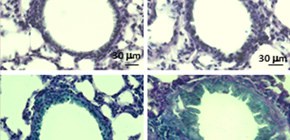
Mechanism for Suppressing Allergic Responses Clarified
The ectoenzyme E-NPP3 negatively regulates ATP-dependent chronic allergic responses by basophils and mast cells
A group of researchers led by TAKEDA Kiyoshi , (Professor, Immunology Frontier Research Center, Laboratory of Immune Regulation, Office of Combined Program on Microbiology and Immunology, Graduate School of Medicine, Osaka University) found a mechanism for preventing the activation of mast cells and basophils that cause bronchial asthma and skin allergies such as atopic eczema.
Recently the number of patients with bronchial asthma and allergic diseases such as atopic eczema has been on the rise. Mast cells and basophils cause such diseases; however, how their activation was controlled had been unknown.
This group made mice without E-NPP3 (CD203c), an enzyme that is highly expressed on basophils activated by allergens and found that the activated mast cells and basophils deteriorated skin allergies, food allergies, and bronchial asthma.
E-NPP3 is a membrane-type enzyme which degrades adenosine triphosphate (ATP). This group examined how ATP was related to allergy and found that mast cells and basophils activated by allergens secreted ATP, which further activated mast cells and basophils and worsened allergies.
This research may lead to the development of new therapeutic methods for bronchial asthma and skin allergy targeting ATP and E-NPP3.
Abstract
Mast cells and basophils play mandatory roles in the pathogenesis of allergic diseases, such as bronchial asthma and atopic diseases. However, it remain unclear how the activity of mast cells/basophils are regulated. We analyzed the function of E-NPP3 (CD203c), which is highly expressed in activated basophils. Mast cells/basophils increased in number and are highly activated in mice lacking E-NPP3. Accordingly, E-NPP3-deficient mice suffered from severe skin allergic inflammation, allergic diarrhea, and bronchial asthma. Mast cells/basophils were shown to secrete adenosine triphosphate (ATP) upon activation. In E-NPP3-deficient mast cells/basophils, ATP level was increased and ATP activated E-NPP3-deficient mast cells/basophils in an autocrine manner, leading to development of severe allergic inflammation. Thus, E-NPP3 suppresses the ATP-dependent activation of mast cells/basophils, and thereby negatively regulates allergic responses.
To learn more about this research, please view the full research report entitled " The Ectoenzyme E-NPP3 Negatively Regulates ATP-Dependent Chronic Allergic Responses by Basophils and Mast Cells " at this page of the Immunity website.
Related Link
